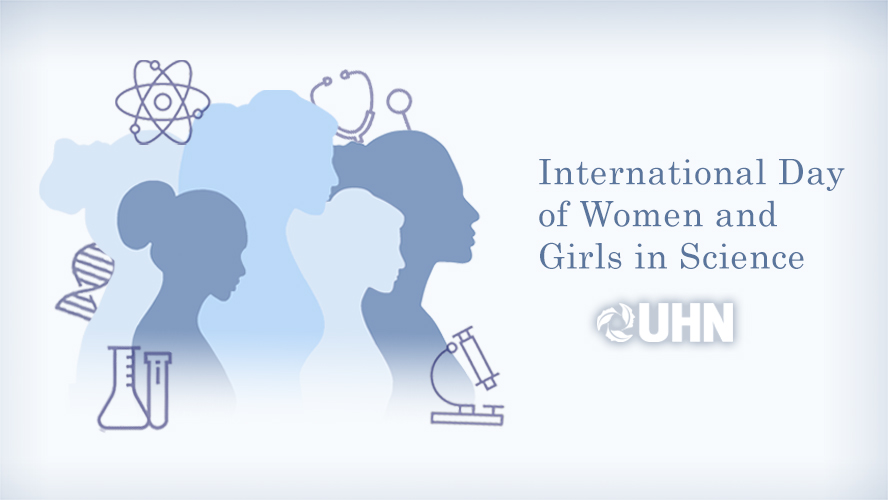
On February 11, we celebrate the International Day of Women and Girls in Science—a day to recognize and honour all women at UHN who make invaluable contributions to advancing health research and innovation.
From leading scientists to postdoctoral researchers and administrators, our diverse community significantly contributes to our mission of excellence in discovery for A Healthier World.
Join us in honouring TeamUHN's incredible women who are making an indelible mark in science as we feature the inspiring stories of five remarkable individuals. Let's celebrate their achievements and contributions to advancing knowledge and innovation.
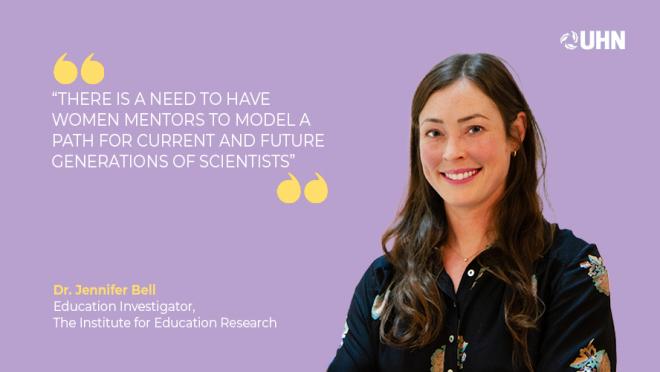
Dr. Jennifer Bell
Research Area:
Ethical issues arising in health care
Favourite Science Fun Fact:
Bertrand Russell, the founder of analytic philosophy, said: “Science is what you know, philosophy is what you don’t know.”
Who or what inspired you to pursue a career in science?
I took an undergraduate philosophy course on Immanuel Kant’s ethics. That summer I worked at the Joint Centre for Bioethics at the University of Toronto where I saw ethics applied to health practice. From then on, I was hooked.
What aspect of your work excites you the most and how does your work help advance UHN's vision of a healthier world?
Our team handles challenging ethical issues in rapidly evolving landscapes like genetics, precision medicine, and AI, collaborating to swiftly understand and apply ethical analyses—a process that proves both thrilling and enlightening. Through this work, we aim to embed ethics and equity across UHN's endeavours, fostering respectful relationships within our community.
What does it mean for you to be a woman in science?
As a philosophically trained ethicist, I am a bit on the periphery of the field of science, but I can appreciate the need to have women mentors to model a path for current and future generations of women scientists and to diversify to include other equity-deserving groups. The International Day of Women and Girls in Science is an important way to highlight the achievements of women in science and create opportunities for discussion about ways forward.
How can we collectively create a more inclusive and supportive environment for women and girls in science?
We can promote women in science by showcasing their achievements, supporting mentors dedicated to inclusivity, addressing socioeconomic barriers hindering women's access to STEM education (e.g., financial and relational pressures), and implementing equitable hiring and training practices to mitigate career interruptions.
How do you see your role in inspiring the next generation of girls interested in STEM fields?
I stand in allyship with women in science and others who are committed to diversifying STEM fields.
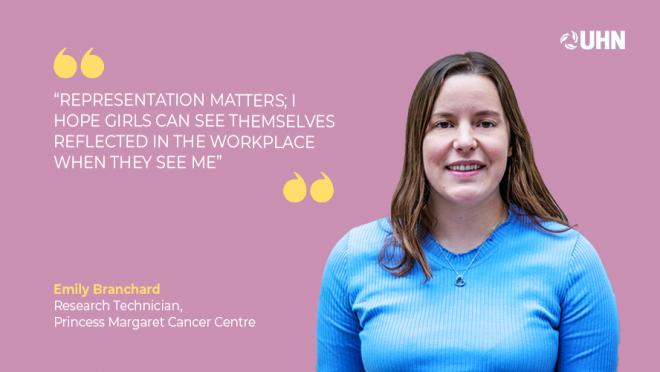
Emily Branchard
Research Area:
Cancer Biology
Favourite Science Fun Fact:
My favourite science fact is the Twin Paradox where there are twin sisters, and one travels to a distant star at nearly the speed of light. According to Einstein’s theory of relativity, time runs slower on her spacecraft than it does on Earth; therefore, when she returns to Earth, she will be younger than her twin sister.
Who or what inspired you to pursue a career in science?
I've always enjoyed problem-solving and was drawn to research because it allows me to gain a deep understanding of my work so I can think critically and solve problems.
What aspect of your work excites you the most and how does your work help advance UHN's vision of a healthier world?
It is extremely rewarding to know that the work I do is meaningful and could quite literally change lives. When I'm having a tough day or am frustrated that an experiment didn't work, I try and step back and appreciate that all the work that we do is moving us toward the goal of improving patients’ lives.
What does it mean for you to be a woman in science?
It means changing the perception of what a scientist is. I can be bubbly, funny, and feminine and still be a smart and capable scientist.
How can we collectively create a more inclusive and supportive environment for women and girls in science?
Putting more women in leadership positions is critical, especially for women of colour and from the LGBTQ+ community. Diversity and diversity of thought are so important for inclusion. If women can see themselves represented in leadership, it will help shape how people think about their identity and where they fit in society.
How do you see your role in inspiring the next generation of girls interested in STEM fields?
Representation matters and I hope that girls are able to see themselves represented when they see me in the workplace. I hope that when future generations think about women in STEM they think "Duh!"
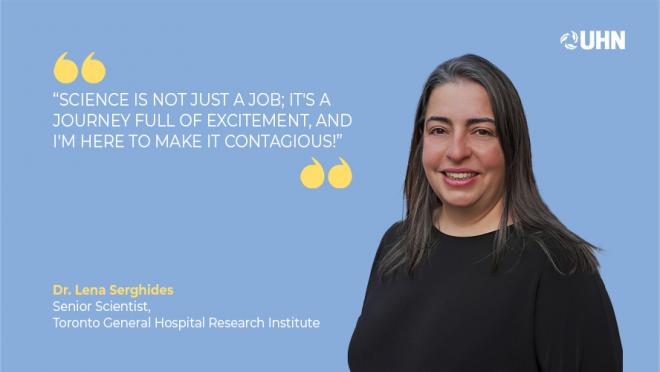
Dr. Lena Serghides
Research Area:
Maternal and child health within the context of HIV.
Favourite Science Fun Fact:
Did you know that primate placenta (my favourite organ!) development relies on retroviral proteins integrated into the germ line due to an ancient viral infection? It's my favorite science tidbit!
Who or what inspired you to pursue a career in science?
My earliest inspiration was my grandfather who was a chemist and an excellent storyteller. Later, I was lucky to have incredible mentors like Dr. Mary Ann Fields who taught me science is not a job but a lifestyle; Dr. Sharon Walmsley who taught me that anything worth doing is worth doing well; and Dr. Eleanor Fish who taught me to stand up for myself and not be afraid to ask for what I deserve. I strive to be such a mentor to other women!
What aspect of your work excites you the most and how does your work help advance UHN's vision of a healthier world?
My favourite part of my work is data analysis – the data are trying to tell me a story and my job is to figure out what that story is. I am really proud of the work my team has done over the years. We study HIV antiretroviral safety in pregnancy. Our data has helped make the treatment of HIV safer for both moms living with HIV and their babies.
What does it mean for you to be a woman in science?
I don't see myself as just a woman in science but as a passionate scientist creating nurturing spaces. I've faced challenges, especially balancing family and science, but I'm pushing for a more inclusive and understanding community.
How can we collectively create a more inclusive and supportive environment for women and girls in science?
Women face challenges in advancing in science due to the demanding nature of the field and family responsibilities, particularly during critical career phases. Supportive partners can alleviate this burden, but no woman should have to choose between motherhood and a scientific career. Recognizing and accommodating the time constraints of women with young children can help retain more talented women in science beyond just parental leave policies.
How do you see your role in inspiring the next generation of girls interested in STEM fields?
I share the thrill of discovery to ignite that spark in the next generation, especially the awesome girls out there. Science is not just a job; it's a journey full of excitement, and I'm here to make it contagious! On this special day, we express sincere gratitude to women scientists, clinician-researchers, and trainees for their exceptional leadership and unwavering commitment to science, inspiring us toward a healthier world.
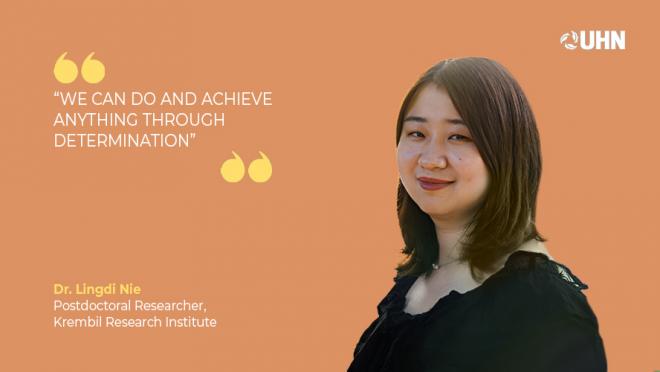
Dr. Lingdi (Lydia) Nie
Research Area:
Neuroscience
Favourite Science Fun Fact:
The longest-living cells in the body are neurons, which can live as long as your lifespan.
Who or what inspired you to pursue a career in science?
I was fascinated by the research process and the fact that you can continuously explore new ideas and topics throughout your career. I have a constant desire to expand my knowledge and expertise, so this appealed to me. I am also passionate about exploring unknown disease mechanisms and discovering potential treatments. Making these novel discoveries and guiding students toward research fulfills me and enables me to make a valuable contribution to society.
What aspect of your work excites you the most and how does your work help advance UHN's vision of a healthier world?
I'm thrilled by our latest venture: crafting 3D human brain tissue cultures in the lab using stem cells sourced directly from individuals with different neurological disorders. This approach promises a deep dive into the intricate workings of these disorders, unlocking insights into their underlying mechanisms. These models will help in the study of patient-specific approaches and personalized medicine and thus advance UHN’s vision of a healthier world.
What does it mean for you to be a woman in science?
It means I am working on the front line to empower women and promote gender equality in science. Although more women are now entering the sciences, efforts are still needed to increase the number of female professors and create a more inclusive and diverse global scientific community.
How can we collectively create a more inclusive and supportive environment for women and girls in science?
It is important that female scientists be included in providing mentorship and advice to younger generations, offering them the guidance and support they need to thrive in their scientific careers. One of the big obstacles that women in science face is navigating family planning, which can lead to missed opportunities, or even career pauses, making it challenging to compete in the highly demanding academic world. One strategy to solve this issue is to have flexible work structures, such as remote work, and increased maternity leaves to help women achieve better work-life balance.
How do you see your role in inspiring the next generation of girls interested in STEM fields?
I hope to lead by example and show the next generation of girls that we can do and achieve anything through determination. It is also my goal to provide mentorship to young girls in science by advising on professional and career development.
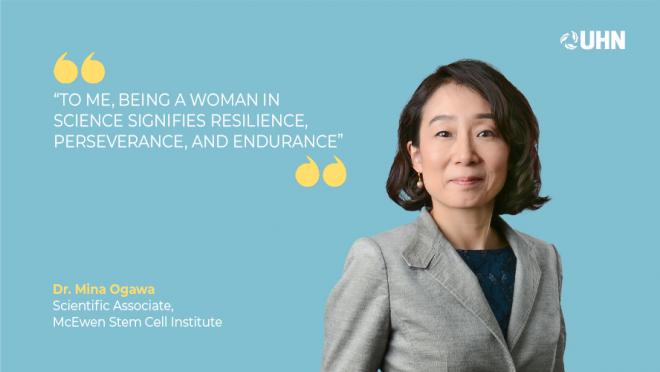
Dr. Mina Ogawa
Research Area:
Conducting research to generate liver-related tissues from human pluripotent stem cells.
Favourite Science Fun Fact:
In a culture dish, observing cells both multiplying and differentiating is tricky. Yet, the human body accomplishes this feat during development, showcasing the captivating dance of specialization and proliferation.
Who or what inspired you to pursue a career in science?
The transformative power of science to influence global health is what ignited my passion for a career in this field. I am also extremely inspired when I connect with great scientists worldwide and hear about their efforts that laid the foundation for their many discoveries.
What aspect of your work excites you the most, and how does your work help advance UHN's vision of a healthier world?
It is most exciting when my research contributes to our understanding of disease etiology or therapeutic interventions. I am fortunate to be a part of UHN as it is one of the world leaders in translational research. My work aims to provide benefits to patients in the clinical setting by inventing cellular therapy.
What does it mean for you to be a woman in science?
Being a woman in science, to me, signifies resilience, perseverance, and endurance—an embodiment of qualities that not only drive personal success but also serve as an inspiration for others. For me, curiosity is the strongest motivation, and I have three amazing children who support me in this endeavour.
How can we collectively create a more inclusive and supportive environment for women and girls in science?
We need to establish mentorship programs to empower women in science, drawing from the impactful guidance of female researchers who have shaped my own journey and highlighted the importance of intergenerational support. This entails combatting gender biases, promoting work-life balance, and ensuring equitable opportunities and recognition in the field.
How do you see your role in inspiring the next generation of girls interested in STEM fields?
I have trained young scientists in my lab, many of whom are women, and have seen rising stars in the field. I strive to become a leader in my field whom the next generation of girls could look up to and be inspired by.
More from UHN on the International Day of Women and Girls in Science:
Meet Kristin Hope @PMResearch: Understanding RNA regulation in cancer stem cells
Krembil’s 4th annual International Day of Women and Girls in Science event

